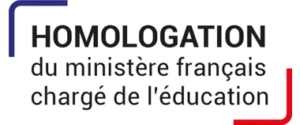High school
High School Cycle:
- 10th Grade: 15 to 16 years
- 11th Grade: 16 to 17 years
- 12th Grade: 17 to 18 years

The general High School consists of three grades: Grade 10, Grade 11, and Grade 12.
- The 10th grade (seconde)
- The 11th and 12th grades lead to the General Baccalaureate exam
The Baccalaureate exam marks the end of secondary education and is an important milestone in a student’s journey. It paves the way for higher education.
The general high school, as opposed to the technical high school, primarily leads to further higher education at a university, preparatory classes for prestigious schools, or specialized institutions. The general education consists of core courses that ensure the acquisition of a shared cultural foundation, along with subjects chosen by the student to deepen their knowledge and gradually refine their academic and career goals.
The high school curriculum is ambitious. It consolidates the knowledge acquired in middle school, ensures the transmission of solid disciplinary knowledge, and contributes to the intellectual development of the students.
The programs foster the development of a shared literary, historical, humanistic, and scientific culture. They provide students with the tools to understand the world in which they live: the evolution of societies, cultures, politics, the different phases of history, as well as the actions and decisions of key figures.
The programs in scientific disciplines are based on theoretical concepts and focus on developing scientific reasoning skills.
They aim to stimulate students’ creativity and their ability to construct sound arguments, exercise critical thinking, and strengthen their civic education to become responsible and independent citizens, aware of their rights as well as their duties.
Digital technology also plays a significant role with the teaching of digital sciences and technology, which helps students understand the growing impact of digital technology on human practices.

General and Technological High School
- General track
The general track prepares students for higher education, mainly at universities, in preparatory classes for elite schools, or in specialized institutions. It combines core subjects, which provide a strong general education, with electives (called “specialties”) chosen by each student. These specialties allow them to deepen their knowledge and gradually shape their academic and career goals.
- Technological track
The technological track prepares students for technical and professional studies in higher education, with opportunities to pursue a professional bachelor’s degree or even an engineering diploma.
The technological baccalaureate is divided into eight streams, including STMG (Sciences and Technologies of Management and Management), which is offered at EFIP. This stream is designed for students interested in how organizations function, workplace dynamics, digital technologies, marketing, performance analysis, and strategic decision-making.
Students in the STMG stream gain strong knowledge in management, business sciences, economics, and law — opening up diverse opportunities for further study in fields such as finance, management control, information systems, human resources, marketing, and communication.
The curriculum includes both general education subjects (common to all high school students) and specialized subjects specific to the STMG option. These include:
- Mathematics (3 hrs)
- French (3 hrs)
- History and Geography (2 hrs)
- English and Spanish/German (4.5 hrs)
- Economics and Law (4 hrs)
- Organizational Management (2.5 hrs)
- Management Sciences (6 hrs)
- Physical Education and Sports (2 hrs)
- Moral and Civic Education (30 min)
- Personalized Support (2 hrs)
In the final year (Terminale), students choose one of four specialization options: Management and Finance, Information and Management Systems, Human Resources and Communication, and Marketing.



